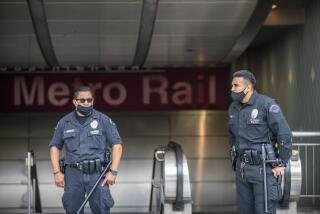Wise Up, Give In, MTA
The Metropolitan Transportation Authority has changed dramatically in the four years since turnaround specialist Julian Burke took over as chief executive. But when Burke retires at the end of the month, one strategy his successor should try to reverse is the MTA’s stubborn battle against a federal consent decree calling for additional buses and improved services to the poor.
The MTA argues that under Burke the agency has improved bus services. The MTA has indeed added buses, replaced ones that should have been retired years ago and begun new services such as the popular Rapid express bus lines. But even with these improvements, a special mediator, a U.S. district judge and, last month, a three-judge panel of the U.S. 9th Circuit Court of Appeals found that the MTA had not yet made up for the neglect that the consent decree seeks to remedy.
The legal wrangling dates back to 1994, when the Bus Riders Union and the NAACP Legal Defense and Educational Fund filed a civil rights suit alleging that the transit agency discriminated against poor and minority bus riders by neglecting the bus system and pouring money into costly rail projects.
In 1996 the MTA board agreed to the consent decree, avoiding a trial. The board members have been fighting over the interpretation of the consent decree and the courts’ authority to enforce it ever since. Even after three rejections of board arguments, eight of the 13 members voted Monday to seek a rehearing. And if the 9th Circuit declines, there’s always the U.S. Supreme Court.
Incoming MTA Chief Executive Roger Snoble has the opportunity to provide a needed reality check. Yes, the MTA has improved. No, not enough. The agency is squandering money on appeals that could be used to buy buses.
More to Read
Sign up for Essential California
The most important California stories and recommendations in your inbox every morning.
You may occasionally receive promotional content from the Los Angeles Times.

![Irvine, CA - July 16: Gina Osborn, shown at her home, is the former head of Metro security is suing the agency for firing her after she filed a claim with the Inspector General. Photo taken at her home Tuesday, July 16, 2024. Gina Osborn, a former FBI agent who was the agency's first chief safety officer, "was summarily terminated by [Chief Executive] Stephanie Wiggins," said her attorney, Marc R. Greenberg. Osborn says in claims that she butted heads with Metro's CEO over security as the agency was trying to put a good face on its efforts to clean up crime and loitering. (Allen J. Schaben / Los Angeles Times)](https://ca-times.brightspotcdn.com/dims4/default/c1419ae/2147483647/strip/true/crop/5981x4000+9+0/resize/320x214!/quality/75/?url=https%3A%2F%2Fcalifornia-times-brightspot.s3.amazonaws.com%2F46%2F07%2Fa88ac0b7466895ee4e137839d93c%2F1467168-me-former-metro-security-chief-18-ajs.jpg)







